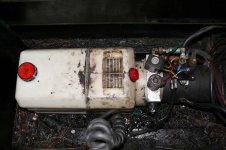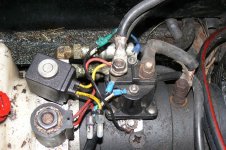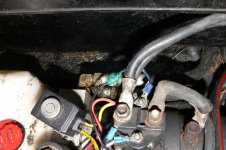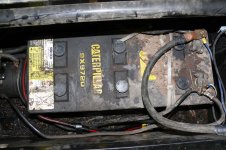texasjohn
Super Member
Dump trailer hydraulics overflow and are slow.. .I wonder why?
OK.. more info...The facts are:
It's a 20 foot gooseneck PJ dump, I purchased it used, it's about 2 years old, was used to do Katrina cleanup. Cylinder is double acting... there is a hose that goes to each end of the cylinder.
When I bought it, I couldn't raise it all the way up because battery was low... but it did start and begin to move the dump bed up with no apparent difficulty.
I got it home, charged the battery, took a long time to charge... but it's a 1100 CCA CAT battery..12 V...I mean, it's BIG. It took a full charge.
Empty, I raised the bed and noticed it was kinda slow, but I'm not experienced and thus didn't know if this was the proper speed or not.. it went up at the same rate UNTIL the sound changed... fluid tank was empty.
Before starting, I had checked the tank... it was low, thus I put in about 2 quarts. I estimate the total capacity is one gallon. However, I had left about 1/2 inch air space (tank lays on its side) from liquid to top of tank. The fill plug is on the very top of the tank.
So, when it went dry, I figured that it needed to be completely filled up and added more fluid... maybe half a quart... ran dump up farther up and tank ran near dry again. Repeated this at least once more till dump was at maximum vertical extension. There was maybe .5 inch or less of fluid remaining in the tank at this point.
I figured that I now had a "full charge" of hydraulic fluid and let it down. To my surprise, I had a very significant overflow of hydraulic fluid from the tank... I began to surmise that the tank capacity and trailer capacity needs were mismatched... but this would be very surprising.... the prior owner had not indicated anything other than the hydraulics were strong... he said that the lift was capable of 20 tons... yes, 20 tons, not 20,000lbs.
Now, for the rest of the story...
I put a bout 1.5 yards of sandy material into the trailer... right over the rear wheels and mostly centered in the bed. I didn't want to overload it the first trip. When I went to raise it to dump, things went very, very slow... we're talking maybe 5 minutes of pumping to nearly empty the hydraulic tank... not wanting to pump air, I added more fluid... again... ran the pump for maybe another 5 minutes before the angle was sufficient to START the material to sliding down. I was, again, out of fluid and not at the top of the stroke, so added more fluid. Another 5 minutes or so of pumping (ever so slow progress, but it DID keep moving up) and I finally was able to complete the dump.
Again, lost a quart or more of fluid when letting the dump back down.
Fluid escaping looks creamy... what I added was clear fluid.
I see no evidence of recent replacement of any hoses, tank, motor, pump, solenoids, or cylinder. All are properly grungy to have been used together for quite some time. However, there is no evidence of ANY hydraulic leak other than what flows backwards out the fill opening which has an air escape cap. I looked carefully to see if there were any external leaks.. none visible at all, and no evidence of any.
So, it all looks factory original, although I do need to call PJ Trailers with the serial number and find out what was originally installed.
Current conclusions:
A) Hydraulic tank needs extra capacity to avoid fluid loss...
I have looked for an hydraulic overflow cap that I could use to replace the existing one and a matching overflow hydraulic tank... like what is used for radiator fluid... but haven't found anything so far... ideas??
B) Hydraulic system needs some repairs to increase lift speed:
I think I need to get a hydraulic pressure gauge to know what the pressures are. Where is the best place to get a hydraulic gauge?
Assuming that the pump can reach the required pressure (3300 lbs), I have read elsewhere that possible problems could be:
1) clogged filter.... haven't figured out where this is as yet.
2) hoses are reversed (hydraulic gauge will help here)
3) high pressure fluid is leaking past the cylinder (from wear, etc.) and dramatically reducing lifting efficiency. In which case we hope that replacement of seals is all that is necessary... and that the cylinder walls are not scored unduly.
If anybody sees a different analysis path or diagnosis, I'm listening. I have a college physics understanding of hydraulics, but no hands-on repair experience.
I have seen in other posts that people indicate that rebuilding a cylinder is not too difficult... the parts are not too much, it is the labor that adds up quickly.
OK.. more info...The facts are:
It's a 20 foot gooseneck PJ dump, I purchased it used, it's about 2 years old, was used to do Katrina cleanup. Cylinder is double acting... there is a hose that goes to each end of the cylinder.
When I bought it, I couldn't raise it all the way up because battery was low... but it did start and begin to move the dump bed up with no apparent difficulty.
I got it home, charged the battery, took a long time to charge... but it's a 1100 CCA CAT battery..12 V...I mean, it's BIG. It took a full charge.
Empty, I raised the bed and noticed it was kinda slow, but I'm not experienced and thus didn't know if this was the proper speed or not.. it went up at the same rate UNTIL the sound changed... fluid tank was empty.
Before starting, I had checked the tank... it was low, thus I put in about 2 quarts. I estimate the total capacity is one gallon. However, I had left about 1/2 inch air space (tank lays on its side) from liquid to top of tank. The fill plug is on the very top of the tank.
So, when it went dry, I figured that it needed to be completely filled up and added more fluid... maybe half a quart... ran dump up farther up and tank ran near dry again. Repeated this at least once more till dump was at maximum vertical extension. There was maybe .5 inch or less of fluid remaining in the tank at this point.
I figured that I now had a "full charge" of hydraulic fluid and let it down. To my surprise, I had a very significant overflow of hydraulic fluid from the tank... I began to surmise that the tank capacity and trailer capacity needs were mismatched... but this would be very surprising.... the prior owner had not indicated anything other than the hydraulics were strong... he said that the lift was capable of 20 tons... yes, 20 tons, not 20,000lbs.
Now, for the rest of the story...
I put a bout 1.5 yards of sandy material into the trailer... right over the rear wheels and mostly centered in the bed. I didn't want to overload it the first trip. When I went to raise it to dump, things went very, very slow... we're talking maybe 5 minutes of pumping to nearly empty the hydraulic tank... not wanting to pump air, I added more fluid... again... ran the pump for maybe another 5 minutes before the angle was sufficient to START the material to sliding down. I was, again, out of fluid and not at the top of the stroke, so added more fluid. Another 5 minutes or so of pumping (ever so slow progress, but it DID keep moving up) and I finally was able to complete the dump.
Again, lost a quart or more of fluid when letting the dump back down.
Fluid escaping looks creamy... what I added was clear fluid.
I see no evidence of recent replacement of any hoses, tank, motor, pump, solenoids, or cylinder. All are properly grungy to have been used together for quite some time. However, there is no evidence of ANY hydraulic leak other than what flows backwards out the fill opening which has an air escape cap. I looked carefully to see if there were any external leaks.. none visible at all, and no evidence of any.
So, it all looks factory original, although I do need to call PJ Trailers with the serial number and find out what was originally installed.
Current conclusions:
A) Hydraulic tank needs extra capacity to avoid fluid loss...
I have looked for an hydraulic overflow cap that I could use to replace the existing one and a matching overflow hydraulic tank... like what is used for radiator fluid... but haven't found anything so far... ideas??
B) Hydraulic system needs some repairs to increase lift speed:
I think I need to get a hydraulic pressure gauge to know what the pressures are. Where is the best place to get a hydraulic gauge?
Assuming that the pump can reach the required pressure (3300 lbs), I have read elsewhere that possible problems could be:
1) clogged filter.... haven't figured out where this is as yet.
2) hoses are reversed (hydraulic gauge will help here)
3) high pressure fluid is leaking past the cylinder (from wear, etc.) and dramatically reducing lifting efficiency. In which case we hope that replacement of seals is all that is necessary... and that the cylinder walls are not scored unduly.
If anybody sees a different analysis path or diagnosis, I'm listening. I have a college physics understanding of hydraulics, but no hands-on repair experience.
I have seen in other posts that people indicate that rebuilding a cylinder is not too difficult... the parts are not too much, it is the labor that adds up quickly.
Last edited:




